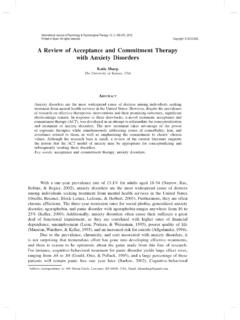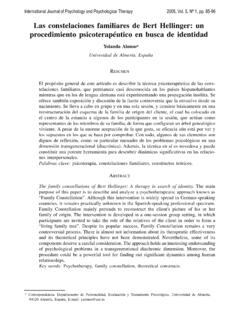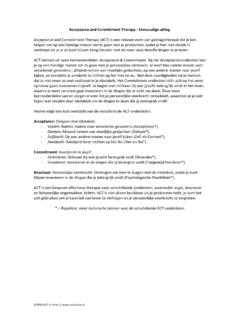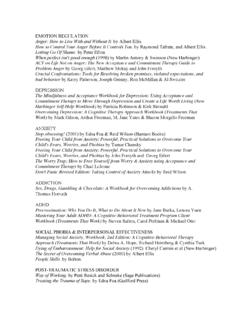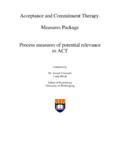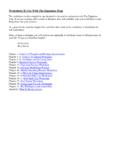Transcription of A Review of Acceptance and Commitment Therapy …
1 International Journal of Psychology and Psychological Therapy 2010, 10, 1, pp. 125-162A Review of Acceptance and Commitment Therapy (ACT) empirical evidence : correlational , Experimental Psychopathology, Component and Outcome StudiesFrancisco J. RuizUniversidad de Almer a, Espa a* Correspondence should be addressed to author: Departamento de Personalidad, Evaluaci n y Tratamiento Psicol gicos, Facultad de Psicolog a, Edificio A, 04120 Universidad de Almer a. Email: Author s acknowledges: The preparation of the article was supported, in part, by funds from the Ministerio de Educaci n y Ciencia, Espa a, (Pro-yecto SEJ05845-2008) and, in part, by Consejer a de Innovaci n, Ciencia y Empresa, Junta Andaluc a, Spain (Grupo de Investigaci n "An lisis Experimental y Aplicado del Comportamiento, HUM-1093).
2 AbstrActThis article analyzes the general empirical evidence concerning Acceptance and Commitment Therapy (ACT). In the first place, a brief description of the ACT philosophical and theoretical roots is presented. Subsequently, the most fundamental characteristics of the ACT model for psychological intervention are described. Then, a Review of the correlational , experimental psychopathology and component, and outcome studies that are relevant for the ACT model empirical status is exposed. In general, the evidence regarding all these types of studies is very coherent and supports the ACT model.
3 Specifically, experiential avoidance is found to be related with a wide range of psychological disorders and mediates the relation between different type of symptoms and psychological constructs; component studies are showing that Acceptance -based protocols are usually more efficacious than other control-based protocols; outcome studies show the efficacy of ACT in a wide range of psychological problems and suggest that it is working through its hypothesized processes of change. However, the limitations of the actual empirical status of ACT are recognized and further research is emphasized.
4 Key words: Acceptance and Commitment Therapy , Relational Frame Theory, Functional presente art culo analiza la evidencia emp rica general concerniente a la Terapia de Aceptaci n y Compromiso (ACT). En primer lugar, se realiza una breve descripci n de las ra ces filos ficas y te ricas de ACT. Posteriormente, se presentan las caracter sticas fundamentales del modelo propuesto por ACT para la intervenci n psicol gica. Se revisan los estudios correlacionales, de psicopatolog a experimental y de componentes, y los estudios de eficacia que son relevantes para este modelo.
5 En general, la evidencia de estos tipos de estudios es coherente y apoya el modelo ACT. Concretamente, se ha encontrado que la evitaci n experiencial est relacionada con un amplio rango de trastornos psicol gicos y que media la relaci n entre diferentes tipos de s ntomas y constructos psicol gicos; los estudios de componentes est n mostrando que los protocolos basados en estrategias de aceptaci n son generalmente m s eficaces que los protocolos basados en estrategias de control; y, los estudios de eficacia muestran que ACT es eficaz en un amplio rango de problemas psicol gicos y sugieren que ACT funciona a trav s de sus procesos de cambio hipotetizados.
6 Sin embargo, se reconocen las limitaciones de la literatura actual sobre ACT y se enfatiza la importancia de investigaciones clave: Terapia de Aceptaci n y Compromiso, Teor a del Marco Relacional, Con-textualismo InternatIonal Journal of Psychology & PsychologIcal Therapy , 2010, 10, 1 http://www. ijpsy. comRUIZA cceptance and Commitment Therapy (ACT; Hayes, Strosahl, & Wilson, 1999) is one of the most representative therapies of the so called third wave of behavior Therapy (see Hayes, 2004 for a description of the three waves).
7 ACT is a model of psychological intervention that is philosophically rooted in Functional Contextualism (Hayes, 1993; Hayes, Hayes, & Reese, 1988) and theoretically rooted in Relational Frame Theory (Hayes, Barnes-Holmes, & Roche, 2001). ACT is conceived as the treatment of the Experiential Avoidance Disorder (Hayes, Wilson, Gifford, Follette, & Strosahl, 1996; Wilson & Luciano, 2002), a functional dimensional approach to psychopathology. Functional contextualism is a pragmatic philosophy that was developed in order to clarify some philosophical issues that could remain unclear in behavior analysis and, particularly, in radical behaviorism (Biglan, & Hayes, 1996; Hayes, Hayes, & Reese, 1988).
8 In general, contextualism views events as ongoing actions in a context. These actions are whole events that can only been separated for pragmatic purposes. Functional contextualism is a specific variety of contextualism whose goals (and truth criterion) are the prediction and the influence of events with precision, scope and depth (Hayes, 1993). Because its goals are prediction and influence, functional contextualism understands that every behavior has to be explained in terms of contextual variables, because, otherwise, it could not be influenced.
9 Therefore, from this perspective, thoughts and feelings do not directly cause other based on functional contextualism, ACT itself reflects it in some ways. For example, ACT emphasizes workability as a truth criterion. Therefore, thoughts are not seen as being correct or incorrect but seen as being useful in obtaining a more valued life. Also, since private events do not cause other behaviors, no attempt on changing the content of private events would be necessary. Relational Frame Theory (RFT; Hayes et al.)
10 , 2001) is a contextual behavioral approach to human language and cognition that has growing empirical evidence . RFT is based on the laws that were established within the functional analysis of behavior, but it represents a qualitative leap because it integrates disparate areas of behavioral research such as equivalence relations and rule-following for doing an experimental analysis of the complex human behavior. The core RFT assumption is that human beings learn to relate stimuli under arbitrary contextual control, in other words, to relate stimuli that do not share formal properties.
